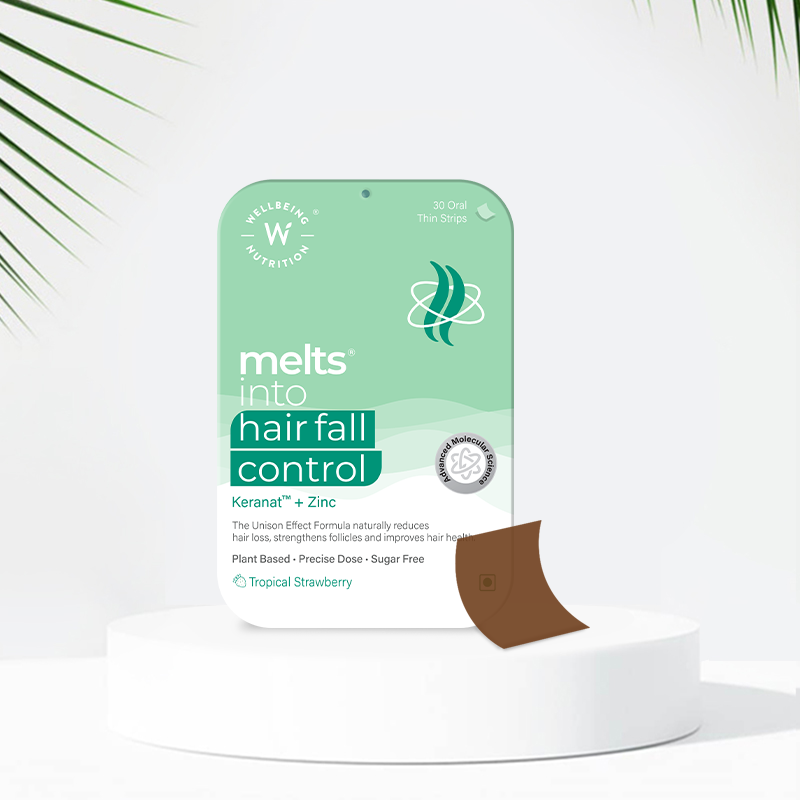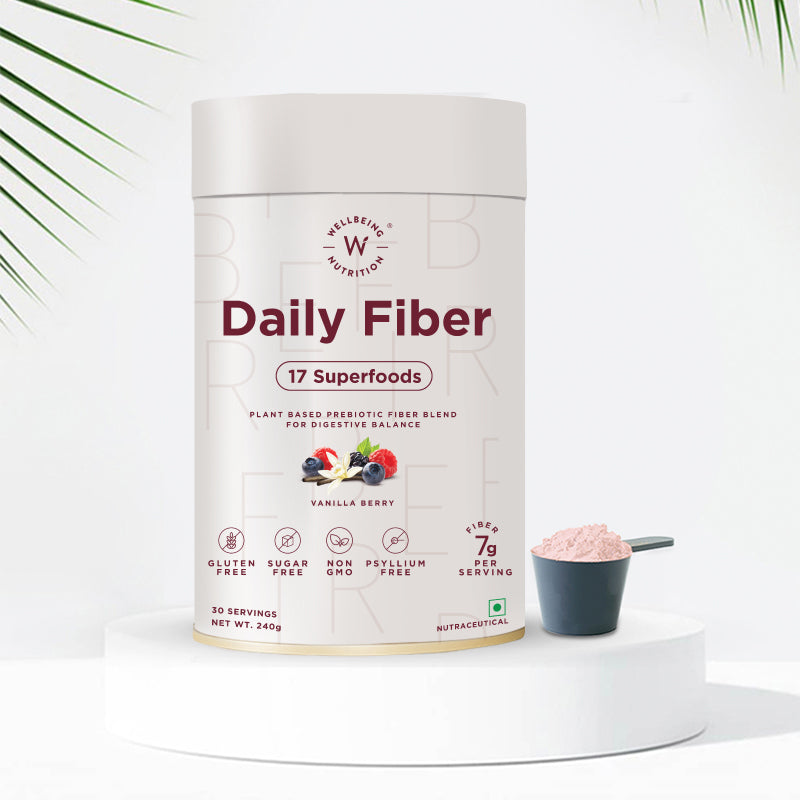Decoding the Benefits of FOS in Foods & Supplements

How many times have you declined a sweet dish or dessert just because you were either on a strict diet, for medical reasons like diabetes, or just simply did not want to give in to cravings? What if we told you that you could enjoy all your favorite sweets without worrying too much? Sounds too good to be true, right? Well, it's possible, due to a special ingredient called FOS.
Fructooligosaccharides (FOS) are a good source of soluble fiber that occurs naturally in fruits and vegetables and also has the ability to sweeten food. FOS is commonly added to food products, and fiber supplements as it acts as a low-calorie sweetener, but it has much more functionality in various industries. Before we explore FOS further, let us first understand fibers.
What Exactly is Dietary Fiber?
Dietary fibres are healthy carbohydrates that do not get digested easily in our gut but provide a host of health benefits. After all, not every carb you consume is unhealthy. Simple carbohydrates are seen in a bad light because they lack fiber, however, complex carbohydrates like FOS can be extremely beneficial owing to their high fiber content.
These dietary fibers are found in whole grains, nuts, pulses, fruits, and seeds. Dietary fiber helps soften and increase the weight and size of your stool, making it easier to pass and, in turn, reducing the likelihood of constipation. Dietary Fiber also helps lower cholesterol, prevent blood sugar spikes, and control our appetite.
Types of Dietary Fibres
This dietary fiber is of two types, soluble and insoluble fiber. Soluble fiber dissolves in water to form a gel-like substance. It also acts as a prebiotic, which provides food for healthy gut microbes while helping them grow and multiply. This type of fiber does not get digested in the small intestine and is passed to the colon (large intestine), where good bacteria digest it. Some common soluble fiber food sources include oats, barley, carrots, citrus fruits, beans, nuts, apples, etc.
Insoluble fiber, on the other hand, does not dissolve in water but adds bulk for a smooth passage of stools. Some common food sources include beans, nuts, whole wheat flour, wheat bran, berries, cabbage, broccoli, etc.
Importance of Dietary Fiber
While dietary fibers are mostly found in whole fruits and vegetables, they are also found in husks and unrefined cereals such as whole grains. Processing and refining tend to remove dietary fiber along with vital nutrients from them. Hence, the emphasis is on eating unprocessed and unrefined food items.
Dietary Fiber holds loads of benefits, like
- Relieving constipation
- Controlling blood sugar levels
- Controlling blood lipid levels
- Controlling blood pressure levels
- Imparting satiety
- Helping in fat loss
Decoding Dietary Fiber: FOS
Fructo-oligosaccharides (FOS) are plant sugars found in a variety of fruits and vegetables. They are carbohydrates made up of fructose (fruit sugar) molecules.
In simple words — Fructo-Fructose, Oligo- More than 3, Saccharides- Sugar molecules
Some naturally occurring FOS sources are commonly found in onions, chicory, garlic, asparagus, tomatoes, bananas, artichokes, etc.
Benefits of FOS
1. Functions like a prebiotic:
FOS acts as an indigestible fiber and natural prebiotic. They pass intact from the small intestines to the large intestines, where they are acted upon by the friendly gut bacteria. They not only provide food for these healthy microbes but also help them grow and flourish.
2. Aids digestion:
By improving gut microflora due to its prebiotic effect and adding bulk to stools, FOS helps improve gut health and the overall digestion process.
3. Relieves constipation:
FOS acts as a natural laxative, thereby helping to clear the bowels. Its indigestible property helps to add bulk to the feces, which renders roughage and promotes the smooth passage of stools. Thereby relieving constipation.
4. Controls blood sugar:
Many artificial sweeteners added to diabetic products still have a high GI (glycemic index), resulting in a temporary spike in blood glucose levels. FOS, on the other hand, has been observed to impart more sweetness without causing a blood sugar rise. This property could be due to its fiber component. A food high in fiber tends to lower its overall GI (glycemic index). Thus, it proves to be a safe alternative for diabetics as well.
5. Lowers cholesterol:
Owing to its high fiber content, FOS has been shown to lower serum cholesterol, triglycerides, and certain phospholipids. Thus, it improves blood lipids in hyperlipidemia and reduces the risk of heart disease.
6. Low-calorie:
FOS is extremely low in calories and can be consumed guilt-free by weight watchers. Food industries are using this compound in their commercial products to their advantage owing to its low calorie content.
7. Sugar substitute:
FOS brings about double the sweetness, minus the blood sugar spike and calories that your regular table sugar (sucrose) brings in. Hence, it is used as a sucrose substitute. This could be helpful for people on a weight-loss program and those with diabetes.
FOS in Commercial Foods
FOS can be obtained naturally as well as produced in the lab. It is widely used as a functional ingredient in food products. Owing to its multiple benefits, it is commercially produced, used in many food products, and even sold independently as a sweetener. Its commercial production and use began in the 1980s in response to increasing demand for healthy foods with a low calorie count. FOS are not just added to food products such as dairy products, beverages, baked goods, fruit drinks, diet soda, nutrition bars, chocolates, etc. but are also being used in the medicine and beauty industries. It is also added to infant formula owing to its prebiotic effect. Some of the popular commercially available forms are
- Daily gel- FOS is also marketed as a prebiotic dietary gel food supplement.
- Liquid sweeteners- Low-calorie, sugar-free FOS is used in liquid syrup form, where it can be added to Indian sweets and bakery items.
- Powdered FOS- Made from Chicory root, commonly used as a coffee alternative owing to its similarity to coffee in taste.
- FOS syrups - Commonly available as blue Agave syrup. They can be used by dilution in water for direct consumption or added directly to food products.
- FOS extracts- They are also made as extracts with varying strengths and concentrations from artichoke or chicory.
FOS in Health Supplements
Owing to its fiber benefits, the healthcare industry is adding this ingredient under the total carbohydrates category as "dietary fiber". The low-calorie sweetening property is an addition to its benefits that make it a potent component of fiber supplements. Apart from improving gut health, these fiber supplements also promote fat loss, blood sugar control, stronger immunity, and holistic well-being. Having a fiber supplement that contains FOS as an ingredient would be a wise decision for your overall well-being. While selecting the best fiber supplement, a smart choice would be to opt for the ones that are formulated using organic superfoods, free from preservatives and artificial colors, to ensure it nourishes the gut bacteria and maintains optimal bowel function. Although most health supplements contain FOS in safe amounts for ingestion, it is always advisable to consult your doctor before starting any new health supplement.
Wrapping Up
By now, you are aware that FOC can provide you with a variety of health advantages in addition to serving as an alternative sweetener. So, try to incorporate fructooligosaccharides into your diet by including fiber supplements, whether they are powders, fiber capsules, or fiber tablets. It is a good alternative for people who are planning to increase their fiber intake through natural sources.
References
Fructooligosaccharides: Risks, side effects, and benefits (medicalnewstoday.com)
(PDF) The Use of Fructo-oligosaccharide (FOS) in Medical Foods (researchgate.net)
Dietary fructooligosaccharides and potential benefits on health - PubMed (nih.gov)
- Choosing a selection results in a full page refresh.
- Press the space key then arrow keys to make a selection.

Consult Expert














